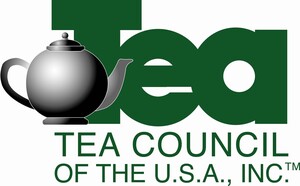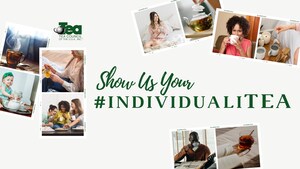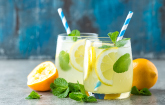NEW YORK, June 2, 2015 /PRNewswire/ -- Twenty-four million Americans would have a hard time deciding between a cup of tea and a roll in the hay, according to a new survey commissioned by the Tea Council of the USA in honor of National Iced Tea Month in June. Whether black, green, oolong or white, enjoying a cup of tea is something many look forward to every day. Here is a look at how Americans are drinking their favorite brew—what, where, when, why and with whom.
Tea Brings the Heat. Twenty-four million Americans think that drinking of cup of their favorite brew is as good as sex. Surprisingly, more men than women (13% vs. 8%) and more Millennials than older generations (16% vs. 7%) feel this way.
Green Tea: The Beverage of Champions. Americans who drink green tea report a greater quality of life than non-green tea drinkers -- being more likely to feel happy almost all the time (77% vs. 71%) and be completely satisfied with their lives (70% vs. 61%). Green tea drinkers are also more likely than those who don't drink green tea to describe themselves as confident (55% vs. 47%), creative (57% vs. 43%), adventurous (37% vs. 28%), spontaneous (35% vs. 26%) and bold (24% vs. 19%).
Celebri-tea Tea Party. President Barack Obama (31%) and Michelle Obama (31%) tie as the public figures Americans would most want to have a cup of tea with. So what about other celebrity duos and rivals? When it comes to pop stars, more Americans would rather enjoy a cup of tea with Taylor Swift (25%) than Beyonce (19%). For a royal tea party, the Duchess of Cambridge, Kate Middleton (38%), wins over Prince William (22%); there is no word yet on whether people would prefer tea with Prince George or Princess Charlotte.
A Case of the Mondays. Need an extra push to get through the first day of the week? Nearly one quarter (22%) of Americans could not survive it without drinking tea. Fewer say this about pressing the snooze button on their alarm (17%), reading their favorite blog (14%) or using their Outlook calendar (12%).
Simple Pleasures. Americans consider drinking a cup of their favorite tea just as rewarding as many of life's other small pleasures, such as having nothing to do on a rainy day (36%), finding a $5 bill on the street (31%), or having a good hair day (26%). More Millennials than non-Millennials compare drinking tea to modern-day "wins", such as having 100% charge on their phone (35% vs. 16%) or getting likes on their social media post (23% vs. 12%).
Southern Style. Despite the stereotype, Midwesterners are more likely than Southerners to drink their tea iced (74% to 68%). But, one southern tradition does remain true – southern tea drinkers are more likely to reach for the sugar than people in any other part of the country (53% vs. 42%). Tea drinkers in the Northeast are more likely than those in other regions to prefer their tea with milk (32% vs. 24%) and those in the West are more likely than others to brew their tea dark (26% vs. 21%) or take it on the go (30% vs. 22%).
A Time and a Place. Americans who drink black tea are most likely to drink it to start their day (24%) and green tea drinkers typically enjoy it in the evening (28%). White tea drinkers are most likely to reach for their brew of choice in the afternoon. But where are people drinking it? While most Americans drink tea at home (89%), many enjoy drinking a cup at a restaurant (48%), or at work (29%).
It's Easy Being Green. More Americans are reaching for green tea than black, white or oolong teas (86% vs. 59%). Younger folks demonstrate a more adventurous spirit when it comes to the types of tea they drink, with more tea-drinking Millennials reaching for green tea (89% vs. 84%), white tea (60% vs. 45%) or oolong tea (53% vs. 42%), than Gen-Xers, Boomers and Traditionalists.
Drink to Good Health. While all types of tea comes from the same plant, Camellia sinensis, and provide similar health benefits, Americans are more apt to associate green tea than black, white, or oolong teas as being good for one's health (66% vs. 27%). Perhaps this is why more than half of Americans would turn to green tea over other types when they are feeling sick (55%) or stressed (52%).
"There are more than 4,000 scientific studies about the health benefits of tea, from weight loss to concentration, but this survey really shows that there is a whole slew of intangible benefits that consumers get from tea. People truly have an emotional connection with tea," said Peter Goggi, President of the Tea Council of the USA.
Visit the Tea Council of the USA or follow @TeaCouncil on Twitter to learn more about the varieties of tea and their many health benefits.
About the Tea Council of the USA:
The Tea Council of the USA is a non-profit association that was formed in 1950 as a joint partnership between tea packers, importers and allied industries within the United States, and the major tea producing countries. It functions as the promotional arm of the tea industry with a primary goal of increasing overall awareness of tea by providing information about its many positive attributes. One of the Council's primary objectives is the dissemination of key scientific findings about tea to the public. The Tea Council does this in several ways including: funding scientific meetings to bring tea researchers from around the world together to share key information and identify next steps for future research projects; and working with health organizations and international scientists to disseminate information about potential positive health effects of tea consumption on a public level.
About the Survey:
The Tea Council of the USA Survey was conducted by Kelton Global online between April 14th and April 23rd among 1,012 nationally representative Americans ages 18 and over with a +/-3.1 percent margin of error. Quotas are set to ensure reliable and accurate representation of the entire U.S. population ages 18 and over.
Photo - http://photos.prnewswire.com/prnh/20150601/219878LOGO
SOURCE The Tea Council of the USA, Inc.
Related Links
WANT YOUR COMPANY'S NEWS FEATURED ON PRNEWSWIRE.COM?
Newsrooms &
Influencers
Digital Media
Outlets
Journalists
Opted In






Share this article